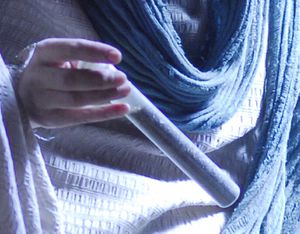Chamalla
More languages
More actions

Chamalla [kə.ˈmɑ.lə] is a potent pharmacological substance with hallucinogenic properties, or the Colonial plant, root or vegetable from which it is extracted. It is used by oracles for religious purposes, and by Colonial medicine as an alternative therapy for certain illnesses, including cancer.
Chamalla withdrawal is highly acute, and resembles the symptoms of heroin addiction (TRS: "Fragged"). President Laura Roslin begins taking chamalla extract medication (distributed as pills) due to her terminal cancer (TRS: "Act of Contrition"). Roslin's visions appear to be induced by chamalla withdrawal (TRS: "Flesh and Bone").
The benefits of the extract are viewed as questionable by those in the medical profession, as evidenced by Doctor Cottle's reaction to Roslin's request to use it when he confirms her cancer is inoperable.
Chamalla has hallucinogenic effects, desirable in its role as an entheogen, but not in its medicinal applications. In Roslin's case, these have been remarkably prescient (TRS: "Flesh and Bone," "The Hand of God," "Kobol's Last Gleaming, Part I").
The chamalla treatments, as expected by Dr. Cottle, do nothing to stop Roslin's cancer from reaching a life-threatening stage (TRS: "Epiphanies").
Chamalla has a very bitter taste. One oracle, Dodona Selloi, prefers to ingest it with candy to sweeten it (TRS: "Exodus, Part I"). When Roslin resumes to take chamalla after her cancer returns, she dissolves it in tea to mask its taste (TRS: "Crossroads, Part I").
Notes
edit- Kamala is a small tree native to southeast Asia (Mallotus philippinensis). Its fruit yields Kamala powder, which has two uses:
- As a dye which produces brilliant yellows and oranges on wool, mohair, and silk.
- As a vermifugal (causing the expulsion of parasitic intestinal worms), generally given mixed with honey, gruel, or treacle, or made into a draught with mucilage of gum acacia and water.
- The historical Oracles at Delphi (Pythia) of Greece took their visions from geothermal fumes and chewing laurel leaves. The use of entheogens is common to many other cultures.
- Cottle's reticence at the prospect of chamalla therapy calls to mind current debate on the issue of medical marijuana. However, the two do not greatly resemble each other in other ways:
- Medical marijuana is used to manage pain and appetite in terminally ill patients, but has no ability to reverse the spread of cancer. Roslin is not told her condition is terminal, merely inoperable - Cottle would like to to attempt a course of doloxan therapy. That Roslin rejects this in favor of chamalla suggests that she believes her condition is hopeless, or that chamalla may have a concrete ability to treat her illness.
- The visions inspired by chamalla are more akin to LSD or psychedelic mushrooms, if anything, although their prescience cannot be accounted for. Peyote is one example of an entheogen said to have an unpleasant flavor, like chamalla. Peyote is used for religious reasons by many Native Americans, much as priests and oracles use chamalla.
- Marijuana addiction is not well-attested, and the withdrawal symptoms suggested for it are not nearly as acute or severe as those displayed by Roslin in "Fragged".
- A Peruvian entheogen known as Camalonga is reported to be a healing agent with psychoactive properties.[citation needed]
